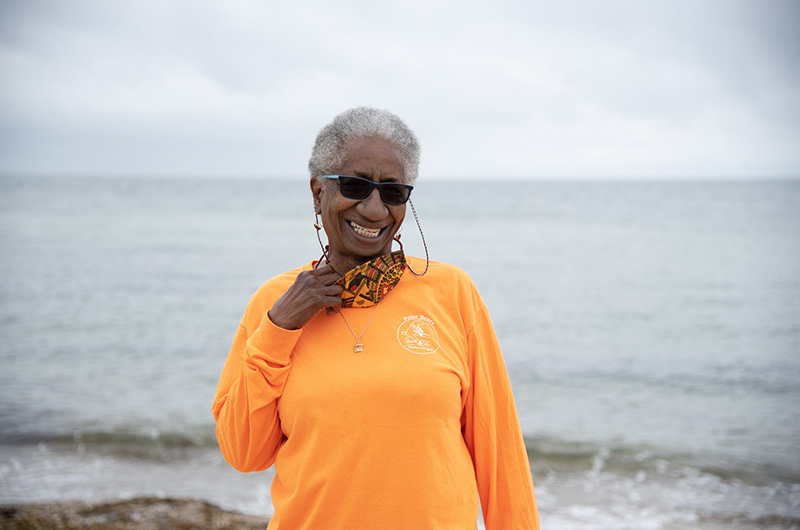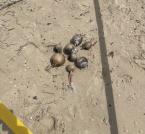For many Americans on Martha’s Vineyard, the Fourth of July has historically been a day of celebration, of fireworks, barbecues, bunting, parades and pride in a country founded on the supposed tenets of freedom, liberty and equality.
For many Americans of color, it has meant something different.
“I am not included within the pale of glorious anniversary!” Frederick Douglass said in his July 5, 1852 speech. “Your high independence only reveals the immeasurable distance between us.”
Over a century and a half after Mr. Douglass’s speech, as dual reckonings over diseases both visible and invisible — systemic racism and Covid-19 — sweep the country, Independence Day will be different for all Islanders this year. But perhaps mostly so for a community of African Americans in Oak Bluffs who, for 74 straight years, have begun their season by joining hands in the Polar Bears friendship circle on the morning of the Fourth of July.
The Polar Bears, a group of sunrise swimmers, exercisers, walkers, bench-sitters and most importantly, friends, who historically gather at Inkwell Beach like clockwork at 7:30 a.m. made the difficult decision to cancel their season in 2020, fearful about how a pandemic could impact a community with an average age over 65 and founded on the principle of holding hands.
Many, of course, are still swimming. Some, like former college athlete and octogenarian Dr. Frances Gaskin, arrive at 6:30 a.m. Others, like the Ret. Hon. Edward Redd, take a dip at 8:30 a.m. And although they might not be swimming together this summer, Caroline Hunter, who ordinarily leads the exercise circle, feels this moment in time demands the activism and togetherness of a group that has persisted for three quarters of a century through the high tides of racism and segregation.
In an early morning conversation at Inkwell Beach this week, three Polar Bears — Ms. Gaskin, Judge Redd and Ms. Hunter — reflected on the unprecedented moment facing America, agreeing that as threats to Black American safety roil the nation the words of Frederick Douglass have never rang more true.
“It never was a celebration for me,” Ms. Hunter said. “It was always a day of sorrow for Native Americans. Even what the word picnic meant for African Americans was never a good experiment because it was a party around the lynching. So, it’s ever more prominent for all of us as African Americans. Our safety is at stake. The lives of our men, our boys, our young women. Everything is at stake.”
The Polar Bears season traditionally begins on the Fourth of July with a prayer for friendship — for friends who are sick or need a special thought. There are normally tables laid out with a bounteous breakfast feast, including grits and casseroles. The group gathers in the water — last year there were 72 bears to start the season — and sings the 1985 song That’s What Friends Are For. Their motto is “I am the source of my joy and infinite possibilities.” Ms. Hunter had it emblazoned on her shirt.
The tradition began in the still-segregated 1950s when nine guests of the African American innkeeper Myrtle O’Brien began going down to Inkwell Beach to swim. Others soon joined, with Ruth Bonaparte creating the friendship and exercise circle. The first white member — a Jewish artist named Rose Treat — joined in the 1970s. The group is now a panoply of colors and backgrounds, just like Oak Bluffs.
“Everybody is welcome,” Dr. Gaskin said. “It started with nine people, but it evolved over the years. It just continued to get larger.”
Nearly 2,000 Polar Bears joined over the course of August last year, with the largest morning circles reaching close to 200 people. The season normally runs until Labor Day.
“One of the reasons I love the Polar Bears is that it is very simple,” Judge Redd said. “You come to the water. You go in. You have a good time. And there’s nothing but positive thoughts when you go home.” But this summer these simple traditions are not possible. “For us, it’s going to be lonesome,” Ms. Hunter said. “If you put up a timed video on Fourth of July, there might not be a soul here at 7, but by 7:30, all of this is filled with tables, and fishes and loaves, and fellowship and many people greeting sometimes for the first time of the season, and lots of hugs and kisses, which we will miss for a long time.”
Dr. Gaskin, who spends six months of the year in St. Croix, has noticed that Narragansett avenue is quieter this year. Friends, she said, have stayed in Florida or New York rather than come to the Island. When the three bears arrived at the seawall this week, they all held themselves — rather than each other — in symbolic bear hugs. Touching was impossible.
With a medical background, Dr. Gaskin said she began wearing a mask early on in the pandemic. This was not just because of the virus. At the age of 83, she decided to learn woodworking in St. Croix. She gave a class to the other students on how to wear masks and be socially distant.
“We can get through this,” Dr. Gaskin said. “And we can get through it much faster if we do these things. And we have to do these things together.”
Every Polar Bear has a long history of survival and perseverance. Dr. Gaskin’s mother, Terese Farrelly Christian, was the first to suggest potlucking on the beach. She died at 102. Ms. Hunter, who spent decades fighting apartheid in South Africa and has lived a life of activism since, joined in her thirties. Her mother stopped going in the water at 96, and died at 101 and a half.
When the bears sat down at a bench on the seawall this week, Judge Redd didn’t even notice that it was his family’s name carved on the back of the bench. He felt that this Fourth of July, Americans of color had an opportunity to think about how their own names and lives are inextricably connected to history.
Even Inkwell Beach, now used as an affectionate term, Ms. Hunter said, was borne out of segregation.
“I think people are naturally going to be more reflective this Fourth of July
because the country is more politicized,” Judge Redd said. “I think people are going to think about what that means, and systematic racism throughout the country. And I think it is going to make black and brown people just more cognizant of it. And I hope that it encourages people to get energized, get focused, and as Michelle Obama says, to come out and vote. I think more than any other time, it’s extremely important that people come out and vote.”
Ms. Hunter seconded that call to action, and said that for Black Americans, who weren’t independent for the first century of “Independence Days,” that this year’s holiday had again brought the success and failures of American democracy into focus.
“It is a challenge for America to live up to its ideals when you have a president who is a white supremacist,” Ms. Hunter said. “He is a disgrace to what that flag should represent. We want that flag to represent us all. But we certainly think American’s need to be reflective. And if the Declaration of Independence or the Bill of Rights means anything, they have to stand up, vote, protest and agitate — and change America. Or perish.”
Both Ms. Gaskin and Ms. Hunter said they would be watching or participating in the online reading of Frederick Douglass’s speech this year on the Fourth of July. And even though the Polar Bear gatherings had to take a year off — and Ms. Hunter encouraged people not to gather — they were not worried about the tradition continuing. The proof was in the family names on the benches, and the generations of children and grandchildren forever tied to the 100-yard stretch of salt brine and seawall across from Waban Park.
“It’s in the DNA of all of our children,” Judge Redd said. “The Vineyard has probably added 10 years to my life. This is a very, very special place. I think all of us here realize that.”
By 8:30 a.m., the trio had dispersed, and Judge Redd’s young nephew, Colin Redd, had arrived. The two put on their bathing suits.
“The basic premise of the Polar Bears,” Judge Redd said, “is that we’re hopeful. We’re an optimistic, very, very positive group. And it’s a positive reinforcement. You’ll come down, and the most negative thing in the water is, isn’t this a great day? Isn’t this a blessing? You can always come down for some positive reinforcement, even in the midst of this pandemic pessimism.”
There was one thing, Judge Redd said, that wouldn’t be different about this Fourth of July. He walked down to the beach, his nephew by his side.
“I’m going to go swimming,” he said with a smile.











Comments (18)
Comments
Comment policy »